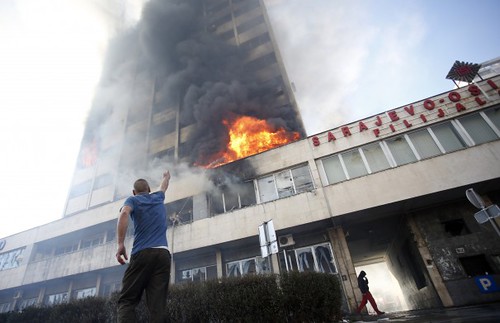
Building set alight by protesters in Tuzla, Bosnia. People are rebelling against unemployment rates of over 44 percent., a photo by Pan-African News Wire File Photos on Flickr.
Violent anti-govt protests spread across Bosnia
By Associated Press
Published: February 7
SARAJEVO, Bosnia-Herzegovina — Anti-government protesters stormed into the Bosnian presidency and another government building in Sarajevo and set them ablaze Friday as riot police fired tear gas in a desperate attempt to stop them.
Smoke was rising from several Bosnian cities as thousands vented their fury over the Balkan nation’s almost 40 percent unemployment and its rampant corruption. It was the worst social unrest the country has seen since the 1992-95 war that killed over 100,000 people following Yugoslavia’s dissolution.
As night was falling Friday, downtown Sarajevo was in chaos, with buildings and cars burning and riot police in full gear chasing protesters and pounding batons against their shields to get the crowd to disperse.
Nearly 200 people were injured throughout the country in clashes with police, medical workers reported.
Bosnians have many reasons to be unhappy as general elections approach in October.
The privatization that followed the war decimated the middle class and sent the working class into poverty as a few tycoons flourished. Corruption is widespread and high taxes for the country’s bloated public sector eat away at residents’ paychecks.
In the northern city of Tuzla, protesters stormed the local government building, throwing furniture and files out its windows Friday before setting it on fire. The local government resigned. By evening, protesters also burned the city’s court building.
Protesters also set upon local government buildings in Zenica, Mostar and Travnik. The crowd in Zenica pushed several cars belonging to local officials into the nearby river and city authorities announced they will resign.
In the northern town of Brcko, the crowd took the mayor hostage briefly before releasing him.
The protests began in Tuzla earlier this week with a clash between police and the unpaid workers of four former state-owned companies. The companies’ new owners were supposed to invest and make them profitable but instead sold the assets, stopped paying workers and filed for bankruptcy.
In an unprecedented move, hundreds gathered Friday in the capital of the Bosnian Serb part of the country, Banja Luka, to back the protesters in Bosnia’s other mini-state, which is shared by Bosniaks and Croats.
“We gathered to support the protests in Tuzla where people are fighting for their rights,” said Aleksandar Zolja, an activist from Banja Luka.
Bosnia privatization protests reach other cities
By Associated Press
February 6
TUZLA, Bosnia-Herzegovina — Violent protests by thousands of unpaid workers in a northern Bosnian city spread to other parts of the country Thursday and have morphed into widespread discontent in an election year about unemployment and rampant corruption.
Police used tear gas to temporarily disperse the protesters in Tuzla who threw stones at a local government building. The protesters returned after the tear gas volley, surrounded the empty government building and set tires and trash on fire. Police were reinforced with special dog units.
The protests in Tuzla, which began Tuesday, are about an ongoing dispute involving four former state-owned companies that were privatized and later filed for bankruptcy.
Thousands gathered in four other cities in solidarity with the Tuzla workers, but also to protest against Bosnia’s nearly 40-percent unemployment rate and politicians whom they accuse of being disconnected from citizens’ needs.
More than two dozen people sought medical help in Tuzla, mostly from the effects of tear gas.
The majority of those injured were police officers, including one who was hospitalized with a chest injury from a thrown object. A police spokesman initially said the officer was fighting for his life, but a hospital later said his injuries were no longer life-threatening.
The demonstrations have reached Sarajevo, Zenica, Mostar and Bihac. The protesters in Sarajevo, the capital, threw eggs at the local government building.
One of them, Nihad Alickovic, called for more citizens to join the protest.
“Take your problems out on the street,” he urged.
Residents of buildings in Tuzla yelled insults and threw buckets of water at the officers who passed by in full riot gear. Elderly neighbors were seen banging cooking pots on their windows and balconies.
The four former state-owned companies, which included furniture and washing powder factories, employed most of the population of Tuzla. After they were privatized, contracts obliged them to invest in them and make them profitable. But the owners sold the assets, stopped paying workers and filed for bankruptcy between 2000 and 2008.
The leader of the Tuzla region, Sead Causevic, told Bosnian state TV that the “rip-off privatization” was already concluded when his government took power and that the workers’ demands are legitimate. He blamed the courts for obstructing justice, saying the workers have turned to them years ago, but no judgment has ever been passed.
Bosnians have many reasons to be unhappy as general elections approach in October.
Besides the unemployment rate, the privatization that followed the end of communism and the 1992-95 war produced a handful of tycoons, almost wiped out the middle class and sent the working class into poverty. Corruption is widespread and high taxes to fund a bloated public sector eat away at paychecks.
No comments:
Post a Comment